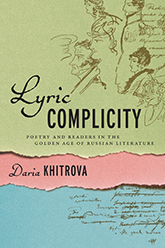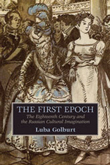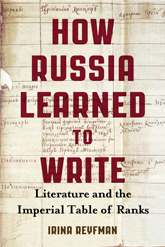|
How Russia Learned to Write
Literature and the Imperial Table of Ranks
Irina Reyfman
Publications of the Wisconsin Center
for Pushkin Studies
David M. Bethea, Series Editor
“Reyfman’s prose is clear and readable throughout, and How Russia
Learned to Write adds an intriguing new reading on canonical texts of
the late eighteenth and nineteenth centuries. It is one of those rare
books you never knew you needed, but answers questions you have
always had.”
—Slavic Review
The Table of Ranks, introduced by Russian emperor Peter the Great in 1722,
mandated strictly enforced obligations to imperial service. Noblesse oblige
was not just a lofty principle; aristocrats were expected to serve in the
military, civil service, or the court, and their status among peers depended
on advancement in ranks. From Sumarokov and Derzhavin in the eighteenth
century through Pushkin and Dostoevsky in the nineteenth, state service
influenced writers’ self-images and the themes of their creative output. Irina
Reyfman illuminates these surprising and diverse outcomes, noting Russia’s
atypical course in the professionalization and social status of literary work.
 Irina Reyfman is a professor of Russian literature at Columbia University. She is the author and editor of several books, including Rank and Style: Russians in State Service, Life, and Literature and Ritualized Violence Russian Style.
Irina Reyfman is a professor of Russian literature at Columbia University. She is the author and editor of several books, including Rank and Style: Russians in State Service, Life, and Literature and Ritualized Violence Russian Style.
Praise
“Compelling, clever, and persuasive. Examining many Russian writers’ self-fashioning as members of the nobility and their careers in public service, Reyfman admirably shows that the understanding of rank should inflect
all our arguments and histories of the writing profession in Russia.”
—Luba Golburt, University of California, Berkeley
“Indispensable reading for all who study Russian literature of the Imperial period. Reyfman adds nuance and necessary reevaluation to our understanding of how literary careers and literary biography evolved in Russia in the eighteenth and nineteenth centuries.”
—Andrew Kahn, University of Oxford
“Can be read profitably by a range of readers, from undergraduates to
specialists. . . . Reyfman’s informed analysis forces us to rethink received
ideas.”
—Slavic and East European Journal
“Reyfman’s ability to interweave sensitive biography with historical understanding and literary insights makes this book essential reading for anyone seriously interested in Russian literature of the imperial period.”
—Russian Review
“Focuses on the neglected topic of how expectations about state service influenced the lives and works of eighteenth- and nineteenth-century writers. . . . Well worth reading for its numerous valuable insights and its fresh perspective on the creative process in Russia.”
—Australian Slavonic and East European Studies
Of Related Interest
|

Lyric Complicity
Poetry and Readers in the Golden Age of Russian Literature
Daria Khitrova |

The First Epoch
The Eighteenth Century and the Russian Cultural Imagination
Luba Golburt |
|
 Larger images
Larger images
New in Paperback!
January 2021
LC: 2015039995 PG
256 pp. 6 x 9
|

